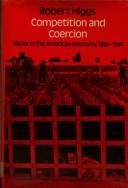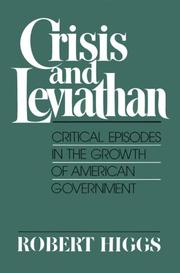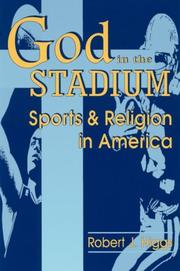| Listing 1 - 10 of 17 | << page >> |
Sort by
|
Book
ISBN: 0892326190 Year: 1985 Volume: vol 4 Publisher: Greenwich London JAI Press
Abstract | Keywords | Export | Availability | Bookmark
 Loading...
Loading...Choose an application
- Reference Manager
- EndNote
- RefWorks (Direct export to RefWorks)

ISBN: 9780195182927 0195182928 0195346084 1280845554 1429431083 9780195346084 9781280845550 0197710042 9780190293000 0190293004 Year: 2006 Publisher: Oakland, CA: Independent Institute,
Abstract | Keywords | Export | Availability | Bookmark
 Loading...
Loading...Choose an application
- Reference Manager
- EndNote
- RefWorks (Direct export to RefWorks)
Higgs, a highly regarded economic historian, makes pointed, fresh economic arguments against war, showing links between government policies and the economy in a clear, accessible way. He boldly questions, for instance, the widely accepted idea that WWII was the chief reason the Depression-era economy recovered.
War --- Depressions --- Guerre --- Crises économiques --- Economic aspects --- Aspect économique --- United States --- Etats-Unis --- Economic conditions --- Conditions économiques --- 338 <09> <73> --- Economische geschiedenis--Verenigde Staten van Amerika. VSA. USA --- Depressions. --- United States - Economic conditions - 20th century. --- War. --- Business & Economics --- Economic History --- Economic HistoryEconomic aspects --- 338 <09> <73> Economische geschiedenis--Verenigde Staten van Amerika. VSA. USA --- Crises économiques --- Aspect économique --- Conditions économiques --- War - Economic aspects - United States --- Depressions - 1929 - United States --- United States - Economic conditions - 20th century --- World War, 1939-1945 --- Economic policy

ISBN: 0521211204 0521088402 0511896719 Year: 1977 Publisher: Cambridge : Cambridge University Press,
Abstract | Keywords | Export | Availability | Bookmark
 Loading...
Loading...Choose an application
- Reference Manager
- EndNote
- RefWorks (Direct export to RefWorks)
Competition and Coercion: Blacks in the American economy, 1865-1914 is a reinterpretation of black economic history in the half-century after Emancipation. Its central theme is that economic competition and racial coercion jointly determined the material condition of the blacks. The book identifies a number of competitive processes that played important roles in protecting blacks from the racial coercion to which they were peculiarly vulnerable. It also documents the substantial economic gains realized by the black population between 1865 and 1914. Professor Higgs's account is iconoclastic. It seeks to reorganize the present conceptualization of the period and to redirect future study of black economic history in the post-Emancipation period. It raises new questions and suggests new answers to old questions, asserting that some of the old questions are misleadingly framed or not worth pursuing at all.
African Americans --- Economic conditions. --- Arts and Humanities --- History

ISBN: 019505900X Year: 1987 Publisher: New York (N.Y.): Oxford university press
Abstract | Keywords | Export | Availability | Bookmark
 Loading...
Loading...Choose an application
- Reference Manager
- EndNote
- RefWorks (Direct export to RefWorks)
Administrative agencies --- -Bureaucracy --- -Welfare state --- -History --- History --- United States --- Politics and government --- -Politics and government --- -Administrative agencies --- -Politics and government -
Book
Year: 1977 Publisher: Cambridge, London, Melbourne Cambridge University Press
Abstract | Keywords | Export | Availability | Bookmark
 Loading...
Loading...Choose an application
- Reference Manager
- EndNote
- RefWorks (Direct export to RefWorks)
Book
ISBN: 1598130897 Year: 2004 Publisher: Oakland, Calif. : Independent Institute,
Abstract | Keywords | Export | Availability | Bookmark
 Loading...
Loading...Choose an application
- Reference Manager
- EndNote
- RefWorks (Direct export to RefWorks)
Power (Social sciences) --- United States --- Economic policy. --- Politics and government
Multi
ISBN: 9780511896712 9780521211208 9780521088404 Year: 1977 Publisher: Cambridge Cambridge University Press
Abstract | Keywords | Export | Availability | Bookmark
 Loading...
Loading...Choose an application
- Reference Manager
- EndNote
- RefWorks (Direct export to RefWorks)

ISBN: 0813108535 0813158060 9780813158068 1322597359 9781322597355 0813119235 9780813119236 Year: 2015 Publisher: Lexington University Press of Kentucky
Abstract | Keywords | Export | Availability | Bookmark
 Loading...
Loading...Choose an application
- Reference Manager
- EndNote
- RefWorks (Direct export to RefWorks)
From the worship of Michael Jordan to the downfall of O.J. Simpson, it has become clear that sports and sports heroes have assumed a role in American society far out of proportion to their traditional value. In this powerful critique of present-day American popular culture, Robert J. Higgs examines the complex and increasingly pervasive control that sports wield in shaping the national self-image. He provides a thoughtful history and analysis of how sports and religion have become intertwined and offers a stinging indictment of the sports-religion-media-education complex.Beginning with the pla
College sports --- Sports --- 796.011.2 --- 796.011.2 Sport en religie --- Sport en religie --- Field sports --- Pastimes --- Recreations --- Recreation --- Athletics --- Games --- Outdoor life --- Physical education and training --- College athletics --- Collegiate sports --- Intercollegiate athletics --- Intercollegiate sports --- Universities and colleges --- University athletics --- University sports --- School sports --- Religious aspects&delete& --- Christianity --- United States --- Social life and customs. --- Religious aspects --- Christianity. --- 796.011.2 Sport en religie. Theologie en religie --- Sport en religie. Theologie en religie
Book
ISBN: 9780813162997 0813162998 0813152488 9780813152486 0813188008 Year: 1981 Publisher: Lexington, Kentucky : The University Press of Kentucky,
Abstract | Keywords | Export | Availability | Bookmark
 Loading...
Loading...Choose an application
- Reference Manager
- EndNote
- RefWorks (Direct export to RefWorks)
To examine the social and cultural significance of the athlete hero in American literature, Robert J. Higgs turns to the works of Ring Lardner, Ernest Hemingway, F. Scott Fitzgerald, Thomas Wolfe, William Faulkner, Robert Penn Warren, Arthur Miller, and Tennessee Williams.Higgs views the athlete in literature not as an artistic creation but as one who reflects the tastes, attainments, beliefs, and ideals of his society. The athletes he describes as Apollonian are the know-it-alls, of whom Lardner's Busher Keefe is an example; the Dyonisian, as exemplified by Irwin Shaw's Christian Darling, wor
Sports stories --- Athletes in literature. --- American literature --- Sports --- Fiction --- History and criticism.
Book
ISBN: 0313213615 Year: 1982 Publisher: Westport (Conn.): Greenwood
Abstract | Keywords | Export | Availability | Bookmark
 Loading...
Loading...Choose an application
- Reference Manager
- EndNote
- RefWorks (Direct export to RefWorks)
| Listing 1 - 10 of 17 | << page >> |
Sort by
|

 Search
Search Feedback
Feedback About UniCat
About UniCat  Help
Help News
News